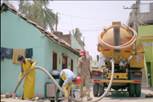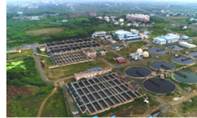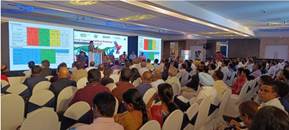Cities focus on Sanitation, Mechanised Desludging & Used Water Management
In commemoration of World Toilet Day 2023, the Ministry of Housing & Urban Affairs (MoHUA) initiated the Clean Toilets Campaign, which will run from November 19th to December 25th, 2023. With an aim to prioritize and accelerate effective operation and sustainable future of public and community toilets, the campaign is marked by a 5-week long initiative to clean and maintain all public and community toilets. With an objective to recognize model public toilets that exemplify cleanliness, accessibility, innovation in design, as well as functionality, the Clean Toilets Challenge has been launched. As a next step, for cities to focus on sanitation, mechanised desludging and used water management, a 2-day national capacity building workshop is being organised under SBM-U 2.0 at Chennai, Tamil Nadu on 23rd & 24th Nov., 2023, to discuss the planning and implementation strategy.
Since its launch in 2014, Swachh Bharat Mission has revolutionized sanitation practices on a global scale. With focus on accelerating sanitation, mechanised desludging and UWM in Tier 2 and Tier 3 cities, SBM-U 2.0 has highlighted the need for innovation, governance, adoption of a circular economy approach by small towns in design and execution to ensure effective management. Among cities with less than 1 lakh population, Panchgani, Patan, Karhad and a few others have set examples in sanitation and waste management. From Swachhagrahis of Panchgani who help in waste segregation to the Kachra Point turning into a beautiful hill station, small cities like Panchgani have focussed on holistic swachhata.


Complete liquid waste management in cities in less than 1 lakh population – a new component introduced under SBM-Urban 2.0 will ensure that all wastewater is safely contained, collected, transported and treated so that no wastewater pollutes the water bodies. Cities like Surat have converted the wastewater generated into the resource by establishing Tertiary Treatment Plants thereby reducing dependency on fresh water resources & creating treated wastewater as an economic resource. Tiruchirappalli functions with private desludging operators who are active at any point of time. For disposal of faecal sludge and septage collected by operators, provisions have been made for co-treatment by setting up decanting arrangements in sewage pumping stations across the city.


To take this forward, MoHUA’s 2-day National Capacity Building Workshop discussed the planning and implementation strategy. The workshop focused on strengthening sanitation sector and was targeted at the senior leadership of State governments like State Mission Directors, nodal officers, of UWM in the State mission, chief engineers and senior engineers of Urban Development Department and parastatal agencies responsible for sanitation, mechanized desludging and UWM implementation in these cities.

The first day of the workshop witnessed experience sharing on O&M of Community and Public Toilets (CT/PTs) by Greater Chennai City Corporation followed by deliberations over Financing in Sanitation Sector, Livelihood opportunities in sanitation sector- a perspective by ASCI & NITI. BMC, Orissa, Noida, Mysore, Telagana, HUL, IIHS, WASH-I, DUSIB, highlighted accessibility and O&M of CT/PTs. The second session of the day highlighted mechanized desludging and discussions were held around Safaimitra Surakshit Sahar – Strengthening Mechanized Cleaning of Sewers and Septic Tanks, operationalising SRA and ERSU, Promoting safety to sanitation workers, and private sectors shared their expectations and business models. Ms. Roopa Mishra, JS, MoHUA shared insights on the Toilet Journey under SBM 2.0 – A National perspective. Speaking at the occasion JS, MoHUA said, “The first principle of the national approach is move beyond the contours that have been laid by a particular programme. Our requirement is to achieve safe sanitation defined by clean land, clean water and clean air.”

